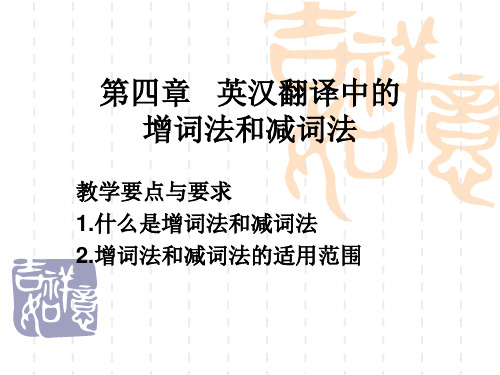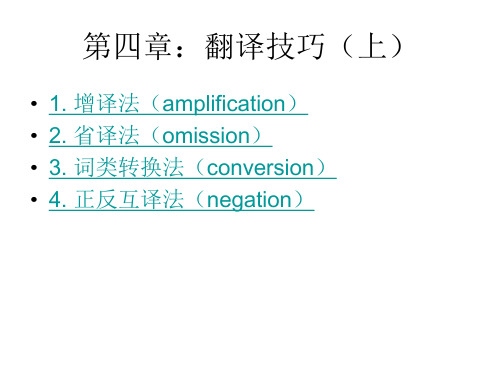第四章 翻译技巧
第四五章 翻译技巧与实践

E—省略;C—重复
The time has come to reaffirm our enduring spirit; to choose our better history; to carry forward that precious gift, that noble idea, passed on from generation to generation:
Expression—动态和静态
And will to the best 我将竭尽所能。。。
of my ability,
We the People have remained faithful to the ideals of our forbearers, and true to our founding documents. —Barack Obama 美国人民一直以来都忠诚于先辈的理想,坚信于 建国之初的宪法。
Lincoln is a lot of time talking about people. we should. "We spent a firm believer in the Africa, as Africa is a nation that suffers from incredible disease." Clinton is a good liar.
Eห้องสมุดไป่ตู้pressiveness
C-- E 合; E—C 分
舒舍予,字老舍,今年四十,面黄无须,生于北平。 Shu Sheyu is also named Laoshe. He is 40 years old. His face is yellow/pale. He has no beard. He was born in Beiping.
英汉翻译教程第四章翻译方法技巧

safe
and
The house needs attention but the roof is sound. sleep: deep and peaceful To have a sound night’s sleep
LOGO
5. good, but not excellent a sound piece of writing 6. physical punishment to give sb. a sound beating
He Hamleted at a chance and regretted for it. 机会到来时他犹豫不决,过后又后悔了。 Hamlet 原是沙士比亚(王子复仇记) 中主人公名,用此人优柔寡段性格来比 喻类似情况。译时抽象化了。
LOGO
We insist that international trade should not be a one-way street. 我们主张国际贸易不应该是有来无往。 One-way street 原意是“单行道” 引申“有来无往”。
LOGO
(二)英语中有些词是中立的本身不表示褒贬 义,但在一定的上下文中可能有褒贬的意味, 译时要相应地表达出来。 The president promised to work to repeat state and federal laws that discriminate Against women. 总统承诺将力求废除歧视(贬义)妇女的州法 及联邦法。 By a 6-3 vote, the court held that this official discriminate did not violate the Constitution. 法院以六票对三票的裁决的认定,政府对这个 问题上才去的区别对待(中性词)的办法并不 违反宪法。
日汉互译日语句子的翻译技巧-变译

句子的翻译技巧第四章变译1、定义:所谓变译,在翻译中是指根据不同的情况,对原文作出不影响原文信息内容表达的、非原则性变通。
它的特点是,行文不拘一格,灵活多变,在思维方式上,在表达形式上,在句子结构上都可以打破原文的程式,以独特的形式来完成语际间的转换。
1)词语的变通(参见第1章第1、2节)2)句型句式的变通◎被动句*汉语被动态汉语被动态的表现形式是由及物动词前加被动介词(如:被、叫、让、挨、遭、受、为…所等)构成,其表现形式大体可分三种:A 动作承受者、动作发出者、被动式(由被动介词和及物动词构成)三者俱全,为完全被动式例:弟弟被他们打了。
B 动作承受者、被动式(省略动作发出者,仍属完全被动式)例:小李家被盗了。
C 句中由及物动词作谓语,含有被动式意义,但形式上却无被动介词,称为简化被动式或不完全被动式例:王老师的文章发表了。
∕麦子收割了。
汉语被动式所表达的内容:多为受害、受损、或感到不快、不利。
但受外国文字的影响,现在汉语中被动句式的表达也已打破传统用法的限制。
如有时也用于中性场合。
例如:“他被选为代表”,另外无生物也可作动作的承受者,构成完全被动式,但仍以受害意义为限。
例如:可以说“信被人拆了。
”(受害),却一般不说“信被写好了。
”日语中使用被动句的场合比汉语多得多,很多情况下日语被动句需要译成汉语主动句,日译汉时一定要根据汉语表达习惯,结合上下文的关系和修辞要求进行翻译。
①日语中由自动词构成被动句很多时候需要翻译成主动句○君も現実離れしたそういう夢をみているから、女にも逃げられたりするんだ。
参考译文:你脱离现实在做梦,所以连老婆也跑掉了。
○猫の手も借りたいほど忙しい時に君に行かれたら、こっちはどうするんだ。
参考译文:忙得不可开交的时候,你一走叫我们怎么办啊!○夕べは一晩中子供に泣かれて一睡もできなかった。
参考译文:昨晚小孩子哭了一夜,吵得我一觉也没睡成。
▲注意:也有译成被动句的场合○雨に降られて、びしょぬれになった。
第4章英汉翻译中的增词法和减词法

2.4 因语序变化而加词
由于英语国家惯用被动结构的语序,而我们 中国人惯用主动句,因而,在翻译中经常要增 加主语,使之变为主动语态,以适应我们的语 言习惯。例如: Cement is known to be a very useful building material. 大家都知道水泥是很有用的建筑材料。
增加背景知识文化而增词
Le Monde, the B.B.C., the New York Times, the entire Arab press, all quote Heikal at length. 法国的《世界报》、英国广播公司、美 国《纽约时报》以及整个阿拉伯报界, 都经常大量引用海卡尔的话。 This great scientist was born in New England. 这位伟大的科学家出生在美国东北部的 新英格兰。
就是在这样的一次场合,我遇到了卡特赖 特一家。当时我住在警察局长盖兹家里。 那天我在台球室里坐着,盖兹进来问我想 不想达桥牌,他们三缺一。
On the wings of hope, ( ) of love, ( ) of joy, Miss Meadows sped back to the music hall, up the aisle, up the steps, over to the piano. 美多斯小姐仿佛插上了希望的翅膀,爱情的 翅膀,欢乐的翅膀,一路飞奔回到音乐厅, 她穿过通道,跑上台阶,三步并作两步走到 钢琴前。
EX. 增加语法中附加含义的词
The old man said, “They say his father was a fisherman. Maybe he was as poor as we are.”
大学实用翻译教程第四章 词语翻译的技巧共66页文档

2、 动词转为形容词
她父母为她的健康不佳而发愁。
Her parents were anxious about her poor health. 获悉贵国遭受地震 ,我们极为关切。 We are deeply concerned at the news that your country has been struck by an earthquake. 她没有意识到自己犯了一个严重的错 误。 She was not aware that she had made a serious mistake.
二、 汉译英
1、动词转为名词 这本书反映了20世纪90年代的中国社会状况。
The book is a reflection of the Chinese society of the 1990s. 据我们了解,贵公司经营中国产品已有多年 历史。
We learn that you have been dealers of Chinese products for many years. 我公司决定按照来函说明的条款,试订下列 货物。
The young man behaved himself extremely well and is,I believe,a much better gentleman than the ensign who abused him. 这位年轻人举止十分端正,我相信从 人品来说要比侮辱他的那个旗手高贵 多了 。
这个民有、民治、民享的政府一 定要永远在地球上存在。
4、名词转为形容词
增译法

第四讲:翻译技巧(上)——增译法
[<]
4). She lingered long over his letter. 她反反复复地 反反复复地回味着他的来信。 反反复复地
第四讲:翻译技巧(上)——增译法
[<]
3. 增加名词
1). First you borrow, then you beg. 头一遭借钱,下一遭就讨饭。 钱 饭 2). Mary washed for a living after her husband died of cancer. 玛丽的丈夫癌症去世后,就靠洗衣服 衣服维持生活。 衣服 3). He ate and drank, for he was exhausted. 他吃了 点东西 东西,喝了点酒,因为他疲惫不堪了。 东西 酒
第四章:翻译技巧(上)——增译法练习
[<]
1. White clouds float over the blue sky. 2. Can you manage without help? 3. I dare say that the Chinese way of reforms is more characteristic and effective than others. 4. He was wrinkled and black, with scant gray hair. 5. We have to analyze and solve problems.. 6. Rain or shine, I’ll go there. 7.He felt the patriot rise within his breast.
第四章:翻译技巧(上)——增译法
[<]
2). As for me, I didn’t agree from the very beginning. 我呢,从一开始就不赞成。 呢
第四章:翻译技巧

第四章:翻译技巧第四章:翻译技巧(上)Amplification(增词法)By amplification we mean supplying necessary words in our translation work so as to make the version correct and clear, to make it more like the language translated into. Of course words thus supplied must indispensable either syntactically or semantically. In other words, a translator is not supposed to add any meaning to the original. There are two kinds: 1)Words for syntactic construction—to secure correctness, 2)Words supplied for semanticcompletion—to secure clearness. Both aim at making the version expressive and readily understood by the reader.Examples:presidential historian ―总统的历史学家‖研究总统的历史学家For mistakes had been made, bad ones, he was severely criticized.―因为已经犯了错误,很严重,他受到了严厉的批评‖―因为已经犯了错误,而且是很严重的错误,他受到了严厉的批评‖Rocket research has proved the str ange fact…..通过火箭进行研究……How she wished she could send that man to the Furies—for the punishment she thought he deserved. Furies [希神]复仇女神(“土地”和“黑暗”的三个女儿, 以清算罪恶为职责, 被描绘成庄严、美丽的女郎, Fury 为其中之一)她真想把那个臭男人交给那母夜叉去整治整治,也好让她出口恶气。
第四章 翻译的技巧参考译文

第四章翻译的技巧Skills in Translation.课堂互动2:翻译句子(参考译文)1.The sky turned to a tender pallet of pink and blue.【译文】天空变成了一块由粉红色和蓝色构成的色彩柔和的调色板。
2. She had never let him know—never breathed a word.【译文】她根本就没让他知道,从未透露过真情。
3.The president now is on a poverty tour.【译文】总统目前正在访问贫困地区。
4. She doctored in the countryside.【译文】她在农村当医生。
5. The old man carefully doctored the split in the cane chair.【译文】老人仔细修补藤椅上的裂口。
6. The mayor of New York City is the Time magazine’s 2001 Person of the Year.【译文】纽约市市长是2001年《时代》杂志的风云人物。
7. The girls all like Bob because he is a football captain. Nothing succeeds like success.【译文】所有的女孩子都喜欢鲍伯,因为他是个足球队长。
有本事又有人缘。
8. An expensive failure can be made into an asset if you’ve learnt from it, but Monsanto still has some learning to do.【译文】失败的代价虽然昂贵,然而只要你能从中汲取教训,那也是一笔财富。
不过,曼山托公司仍然需要总结教训。
9.In the social production which men carry on they enter into definite relations that are indispensable and independent of their will; these relations of production correspond to a definite stage of development of their material powers of production.【译文】人们在自己生活的社会生产中发生一定的、必然的、不以其意志为转移的关系,即同他们的物质生产力的一定发展阶段相适合的生产关系。
- 1、下载文档前请自行甄别文档内容的完整性,平台不提供额外的编辑、内容补充、找答案等附加服务。
- 2、"仅部分预览"的文档,不可在线预览部分如存在完整性等问题,可反馈申请退款(可完整预览的文档不适用该条件!)。
- 3、如文档侵犯您的权益,请联系客服反馈,我们会尽快为您处理(人工客服工作时间:9:00-18:30)。
2. He was a regular visitor.
他经常来。 3. What kind of sailor are you? (a bad sailor or a good sailor?) 你晕不晕船?
• 8. I am afraid I can’t teach you swimming. I think my liter brother is a better teacher than I • .我未必会教你游泳。我想我的弟弟比我教 得好。
• • • •
4. The local audience was most receptive. 当地听众能接受新事物。 5. He said the meeting was informative. 他说这次会议提供了不少信息。/他从这次 会议中得到了很多信息。 • 6. Many investors are still fearful of the ever-changing local policies. • 许多投资人对当地多变的政策仍怀有戒心。
• 4. You pass from the heat and glare of a big open square in to a cool, dark cavern. • 你从一个巨大的露天广场上炎热而耀眼的阳光中进 入凉爽阴暗的洞穴。 • 5. As he is a perfect stranger in the city, I hope you will give him the necessary help. • 他对这个城市完全陌生,所以我希望你能给他必要 的帮助。 • 英语中有些名词加不定冠词作表语时,往往可以转 译成形容词(例4和例5) 。又如:The blockade was a success. • 封锁很成功。
第四章:翻译技巧(上)——词类转换法
[<]
B. 英语中加后缀-er, -or 的名词,在句中并不表身 份和职业,而是含有较强的动作意义。
1. He is no smoker, but his father is a chain-smoker.
他倒是不抽烟,但他的爸爸却一支接一支地抽(是个 老烟枪)。
• 3. Edison patented over one hundred separated inventions during his life. • 爱迪生一生中得到一千多项发明项目的专利。 • 4.It is chiefly characterized by its simplicity of structure. • 它的主要特点是结构简单。 • 5. He was snuffed by the top-ranking officials there. • 他受到那边高级官员们的冷遇。
第四章 翻译技巧(上)
第二节 词类的转换
英语:印欧语系(Indo-European language family) 日耳曼语族(Germanic branch) 西日耳曼语支(West German Dialect)
汉语:汉藏语系
由于英汉两种语言在词汇和语法结构方面有许多不同, 因此在英译汉时很难将两种语言的词汇或结构一一对应。 为使译文既忠实于原文又符合汉语习惯,翻译时需要适当 地把原文中某些词的词类转换成译文的另一种词类,这就 是“词类转换”。
• 1. 采用这种新装置可以大大降低废品率。 • The adoption of this new device will greatly cut down the percentage of defective products. • 2. 汉语的特点之一,是动词占优势。 • One of the characteristics of the Chinese language is the predominance of the verbs. • 3. 仔细比较一下,就能看出他们的不同。 • Careful comparison will reveal to us their difference.
第四章:翻译技巧(上)——词类转换法
[<]
A. 由动词的派生词名词(或含有动作意义的 名词)转译为动词
1. His very appearance at any affair proclaims it a triumph.
无论什么事情,只要他一露面,就算是成功了。 2. An acquaintance of world history is helpful to the study of translation.
Exercise
• 1. The current troubles have brought a sober recalculation. • 2. After several failed attempts, the first survivor was finally hoisted aboard the chopper. • 3. Frequent exposure to something or someone will usually cause liking rather than contempt. • 4. She tried to smile, but I saw the resignation and acceptance in her eyes. • 5. The little baby had downy, faint blond hair and the suggestion of a dimple in her cheek.
读一点世界史,对学习翻译是有帮助的。
3. A view of Mt. E-mei can be obtained from here.
从这儿可以看到峨嵋山。
• 4. He urged upon citizens of the country the necessity of persisting in participation in political controversies. • 他告诫全国公民,必须坚持参加政治论战。 • 5. The sight and sound of our jet planes filled me with special longing. • 看到我们的喷气式飞机,听见隆隆的机声,令我 特别神往。 • 6. On the walk through the campus they saw many students reading in the garden. • 漫步校园时,他们看见许多学生在公园里看书。
第四章:翻译技巧(上)——词类转换法
[<]
3. Stevenson was eloquent and elegant—but soft.
史蒂文森有口才、有风度,但很软弱。
no less than… “同 … 一样”,“不亚于”
4. This problem is no less important than that
[<]
B. Adverbs—Adjectives
4. The English language has changed subtly and pervasively.
英语的变化很敏感,很普遍。
5. She looked at me expectantly. 她用期待的眼光看着我。 6. Hopefully, it will be done early next month. 下月初完成这项工作是大有希望的。
第四章:翻译技巧(上)——词类转换法
[<]
3. 转译成形容词
A. Nouns—Adjectives
1. I can note the grace of her gesture. 我可以看到她优雅的举止。 2. We have seen the beauty of Mt. Tai. 我们看到了美丽的泰山。 3. Independent thinking is an absolute necessity in study. 独立思考是学习所绝对必要的。
第四章:翻译技巧(上)——词类转换法
[<]
2. 转译成名词
A. Verbs-Nouns 英语中有许多由名词派生的动词,以及由名词转用的 动词,在汉语中往往不易找到相应的动词,这时可将 其转译成汉语的名词。如: 1. She behaves as if she were a child. 她的举止跟一个孩子一样。 2. A well-dressed man, who looked and talked like an American, got into the car. 一个衣着讲究的人上了车,他的言谈举止酷似美国人。
第四章:翻译技巧(上)——词类转换法
[<]
D. 前置词转换为动词
1. “Coming!” Away she skimmed over the lawn, up the path, up the steps, across the veranda, and into the porch. “来啊!” 她转身蹦着跳着地跑了, 越过草地, 跑上小径, 跨上台阶, 穿过凉台,进了门廊。 2. Jones opened the windows to let fresh air in. 琼斯把窗子打开,让新鲜空气进来. 3. That day she was up before sunrise. 那天她在日出前就起来了.
• • • • •
1. 他突然发脾气,使老头儿大吃一惊。 2. 本书反映父辈时代的中国社会。 3. 绝对不允许违反交通规则。 4. 这几本书陪伴我度过了愉快的童年。 5. 我出生的时候,家中没有一件像样的家 具。
C. 形容词转换为动词
• • • •
• • • • •
1. The buses are crowded. 公共汽车很拥挤。 公共汽车上挤满了人。 2. They are doing everything to prevent a possible war. 他们在尽一切努力制止一场可能的战争。 他们在尽一切努力制止一场可能发生的战争。 3. They were news-hungry. 他们消息饥饿。 他们急于想得到(打听到)消息。
